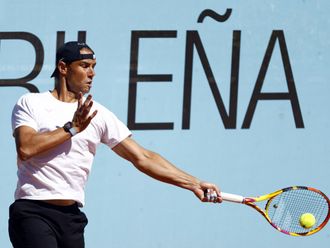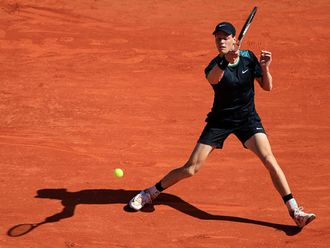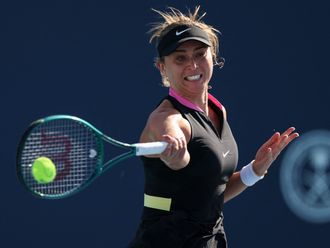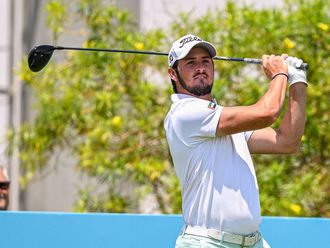It has not quite been a great year for Roger Federer. How can a player of Federer’s historic heft call any tennis year great when he fails to win a Grand Slam title?
But it has been — without a doubt — a surprising, resurgent, deeply impressive year, and he now has a chance during the next few weeks to make it something genuinely special.
At the advanced tennis age of 33, Federer has a fighting chance of catching Novak Djokovic to become the oldest year-end No 1 in history and can also help win the first Davis Cup for Switzerland in a grand French venue and raucous atmosphere worthy of the occasion.
Along the way, he is quite capable of extending his all-time men’s record by winning a seventh year-end championship at the World Tour Finals in London.
“Lots of candy to put in the trick or treat basket near the end of the year,” said Tony Godsick, Federer’s long-time agent. “He will try to do as much as he can, but I don’t think anyone questions his scheduling. He’s a master of that, so we’ll see. It’ll be a lot.”
Federer’s ability to understand the limits of his own body and psyche has been essential to his ability to endure while remaining free of major injury.
The latest member of his peer group to retire was Nikolay Davydenko, the 33-year-old Russian, last week. Federer plays on and has hardly overdone it lately: taking a long break after the US Open before deciding to go to Shanghai, where he saved five match points in his opening match against Leonardo Mayer and then swept to the title, beating Djokovic 6-4, 6-4 in the semi-finals along the way.
But there could clearly be temptation to overdo it from here. Federer is playing in his hometown tournament in Basel, Switzerland, this week and then at the indoor Masters 1000 event in Paris next week. After that, he would get a one-week break before London, followed immediately by the Davis Cup final in Lille, where the French will put down an indoor clay court in a converted football stadium that is already sold out for all three days of the event.
If Federer has success in each individual tournament, it may sound like too much tennis, particularly if he wants to be at his sharpest for the Davis Cup final.
Big advantage
“I think if somebody can do it all, then Roger is the one who can do it,” said his co-coach Severin Luthi in a telephone interview. “But it’s still possible that if he, say, wins Basel or really goes deep and wouldn’t feel 100 per cent, then he would maybe skip Paris. It’s a big advantage that this year there’s a week off between Paris and London.”
Federer is hardly the only superstar with tough choices to make. Rafael Nadal is in Basel despite appendicitis, which is apparently going to require surgery at some stage soon. Without being privy to Nadal’s medical records, it looks unnecessarily risky for him to be taking a chance that the appendix might rupture, which could be a serious matter.
True, he has a contract with the Basel tournament and missed it last year. True, it has been, on balance, a frustrating season with the big exception of his ninth French Open title. But at this stage it would seem wiser to get healthy and regroup for 2015.
As for Djokovic, who is in a strong position to finish at No. 1 for the third consecutive year, his wife Jelena gave birth to their first child this week. So now will Djokovic skip Paris or even the World Tour Finals in London — thus opening the door wide for Federer — or does he play on?
“Strange things could happen,” said Brad Gilbert, the coach and ESPN analyst.
Indeed they could, but then it has been a men’s season full of surprises for a change: beginning with Stan Wawrinka’s winning the Australian Open and continuing last month with Marin Cilic’s winning the US Open after beating Kei Nishikori in a final lacking any member of the customary cast (Djokovic, Nadal, Federer and Andy Murray).
Cilic demolished Federer 6-3, 6-4, 6-4 in the semi-finals, wrecking Federer’s chances this year of adding to his total of 17 Grand Slam singles titles. His last came at Wimbledon in 2012.
Deflated? Certainly, and he might still be if Mayer had converted on one of those five match points in Shanghai. But the Argentine’s best chance — a short backhand — struck the tape, and Federer clicked into a higher gear.
This season clearly represents progress, best exemplified by Federer’s record against top-10 opponents. He was 4-10 against them in 2013, but is 13-4 this year.
His chronic back problems have not resurfaced. A new, larger-headed racket has clearly helped him regain some power and precision relative to the field. Adding boyhood idol Stefan Edberg to the coaching team on a part-time basis has helped Federer’s volleying, attacking game and, so it seems, his sense of well-being.
“One of the most important things is that he’s healthy, that he’s got his back under control,” Luthi said. “That was the big, big problem last year. Because suddenly, if you are not 100 per cent, then you are starting to maybe do different movements, and then you are always thinking of how to move and how to play.”
“He’s taking a lot more cuts down the line with it, too, and doing it a lot earlier in matches,” Gilbert said. “He’s starting to chip and charge a bit, coming in a lot more, trying to shorten the point.
“But I think, more than anything, he just really enjoys his tennis, loves competing. People say maybe he can’t win another big one. Father Time gets everyone, but I’m telling you, he’s an incredibly young 33.”
It has not quite been a great year, but it already makes for quite a scrapbook. Time to fill the last few empty pages.
— New York Times News Service











